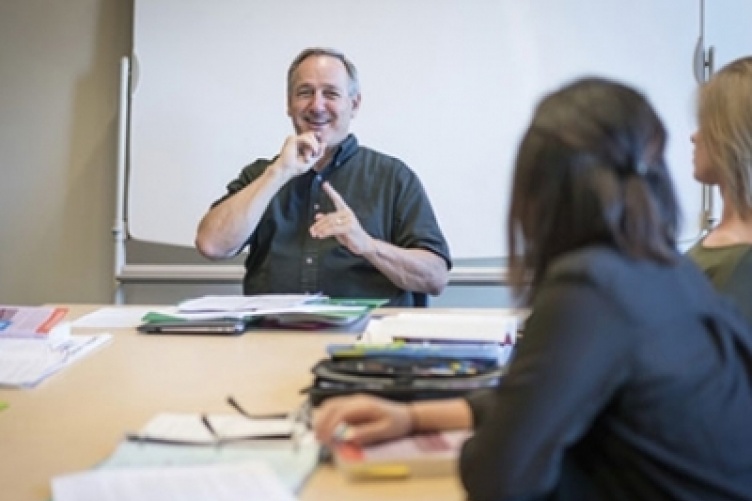
Jack Hoza, professor and director of the ASL/English Interpreting program, working with students at UNH Manchester.
Jack Hoza, professor and director of ASL/English Interpreting, is the subject of a chapter in a new book, in which 17 leading interpreter educators from around the world were interviewed about how research has informed their teaching in the classroom.
The volume, Conversations with Interpreter Educators: Exploring Best Practices, written by Christine Monikowski and just released by Gallaudet University Press, is described on the publisher's website as "a volume that collects and distills the best teaching practices of leading academics in the interpreting field… Through individual interviews conducted via Skype, Monikowski engages them in informal conversations about their teaching experiences and the professional publications that have influenced their teaching philosophies."
The first chapter of the volume reports on the interview with Hoza and focuses on his recent research, which culminated in the publication of his book, Interpreting in the Zone: How the Conscious and Unconscious Function in Interpretation, published by Gallaudet University Press in 2016.
In the interview Hoza discusses how interpreters — as well as other professionals — can get "in the zone," and how he uses the findings from his research to structure an approach to teaching interpreting that aids in his goal of helping interpreting students to learn to "think like an interpreter" (p. 3). In this chapter, he defines being "in the zone" as those times when professionals are "completely absorbed in what they are doing as professionals,… things are just kind of clicking, (and)… they are producing their best work. Their skills rise to the occasion. They're able to handle things. They're creative (and)… they can come up with solutions to things that when they're not in the zone, they can't do" (p. 4).
Hoza stresses the importance of self-reflection, which involves application, theory and exploring one's work. His research finds that there are two types of professional interpreters (two types of experts): those who are efficient and follow rules of thumb, and those who can step back from their work and explore it to have greater insight into what they are doing and to be more creative in their abilities to problem-solve.
Hoza wants interpreting students to develop the ability to be self-reflective, insightful,and creative, which — according to his research — are all indicative of interpreters who are the most trusted and successful in the interpreting field. He states that he wants students "to be aware of what they are doing, to be able to think about it, because… that can guide them for the rest of their lives" (p. 8).
Both books, Conversations with Interpreter Educators and Interpreting in the Zone, are available from Gallaudet University Press.
















































